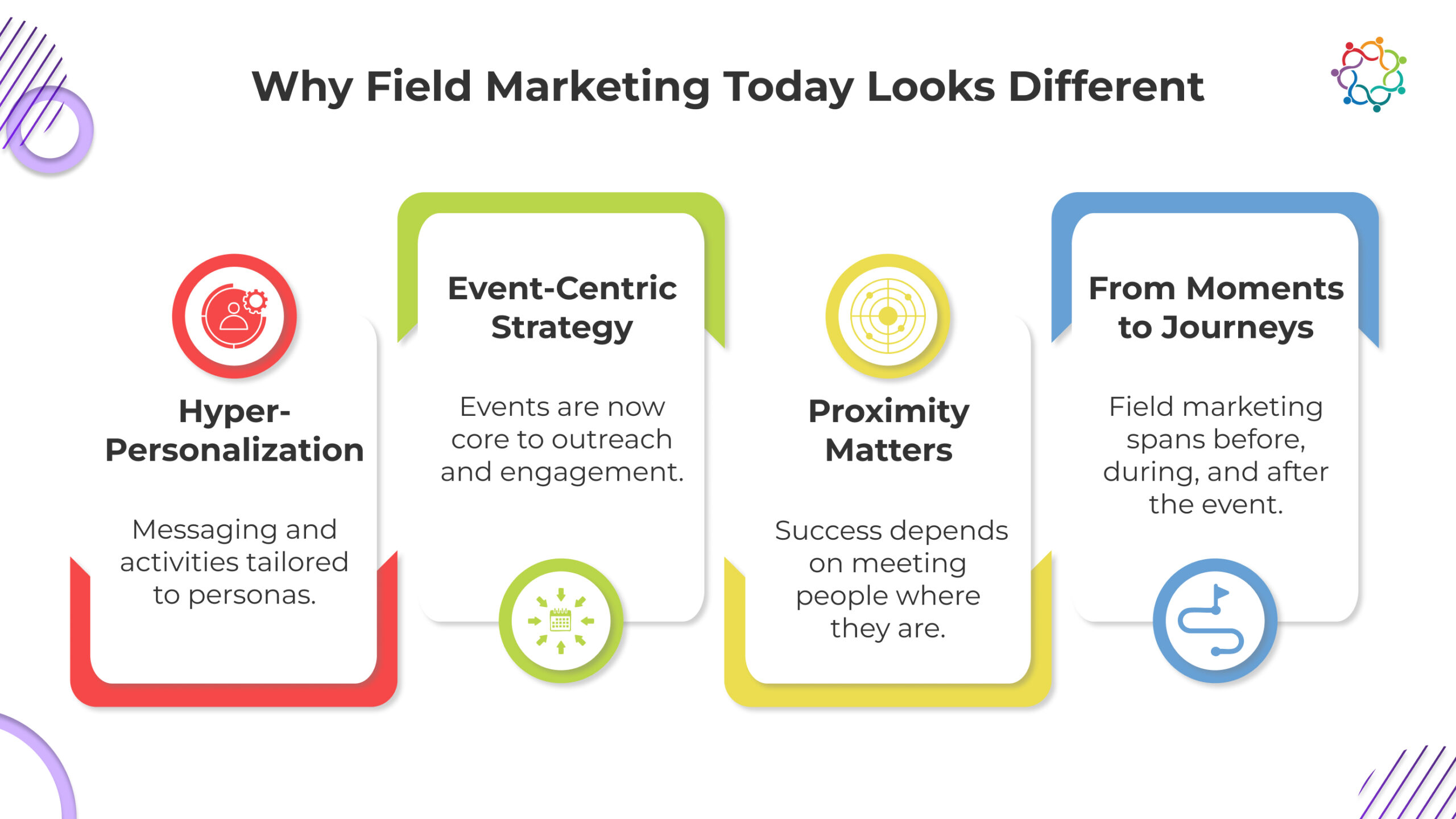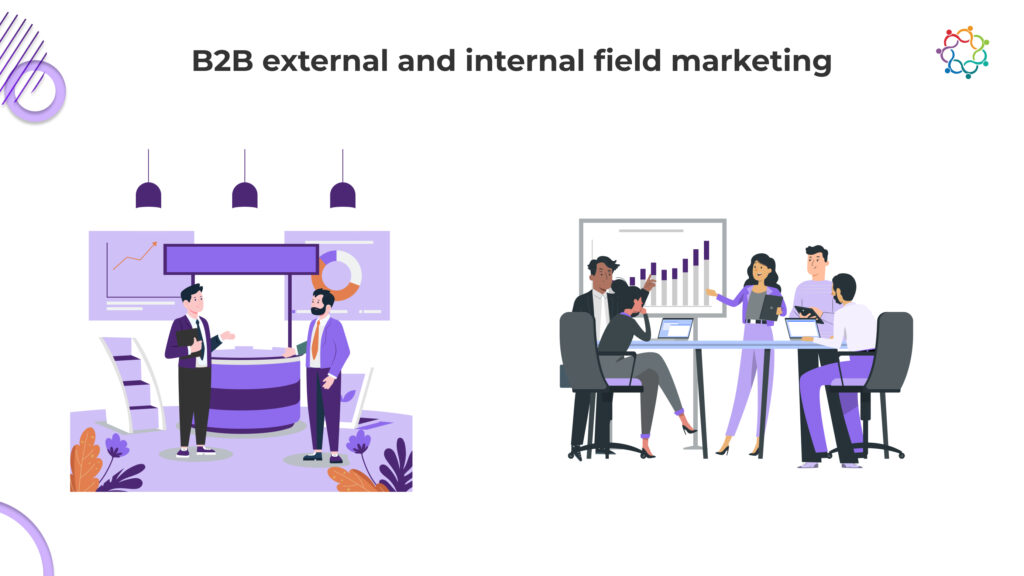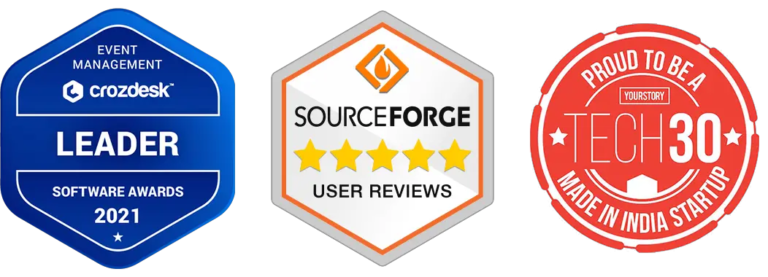Samaaro + Your CRM: Zero Integration Fee for Annual Sign-Ups Until 30 June, 2025
- 00Days
- 00Hrs
- 00Min

Traditionally, field marketing conjured up images of brand reps handing out samples or setting up booths in public spaces. But in today’s business landscape, field marketing events are far more strategic. It’s no longer just about physical presence – it’s about personalized, localized engagement that creates meaningful connections with a defined audience.
Unlike broad-based digital campaigns, field marketing zeroes in on targeted interactions – whether it’s a curated executive dinner, a focused product demo, or an internal team kickoff. The goal? Direct influence on relationships, pipeline, and brand perception.

Despite the rise of digital automation and remote communications, nothing replaces the power of a handshake, a shared laugh during a workshop, or a question answered live by a product expert. Event marketing has emerged as the backbone of modern field marketing because it delivers:
In a world saturated with digital noise, people crave authenticity – and events provide just that.
Whether you’re bringing decision-makers together for a closed-door roundtable or gathering distributed teams for a virtual town hall, proximity matters. Field marketing events excel by placing your brand where it matters most – close to the audience. This could mean a pop-up roadshow near a key client HQ or a virtual training session accessible to every corner of your workforce.
Events bridge the gap between message and meaning – between brand intent and audience experience.
This guide is your roadmap to mastering field marketing events. Whether you’re a B2B marketer aiming to accelerate pipeline, or a corporate communicator looking to engage your internal teams, you’ll find actionable strategies here to:
Let’s dive into how field marketing can become your most powerful tool for creating connections that drive results.
As business models evolve and customer journeys become more fragmented, field marketing events offer a powerful way to unify touchpoints and deliver meaningful engagement. From fueling B2B growth to reinforcing internal culture, events are no longer a “nice to have”, they’re a strategic necessity.
In the world of B2B events, decisions aren’t made overnight — they’re built on trust, relevance, and long-term value. Field marketing helps accelerate these relationships in ways that emails and digital ads simply can’t.

Field marketing isn’t just outward-facing. Many of the most successful companies use internal events as a strategic lever to strengthen teams, share knowledge, and boost morale.
In short, field marketing events deliver measurable benefits across both external and internal audiences. They drive pipeline, deepen relationships, and help build organizations that are not only more productive, but more connected. Up next: how to build a winning strategy that turns these opportunities into repeatable success.
Every impactful field marketing event begins with a strong event strategy. Whether you’re targeting external prospects or internal stakeholders, success hinges on clarity, intentionality, and thoughtful execution. This section breaks down the foundational components that define high-performing B2B and corporate event strategies.
Without clear goals, even the most well-executed event can miss the mark. The first step in any event strategy is to define what success looks like, and make it measurable.
Knowing who you’re speaking to is just as important as what you’re saying. Audience targeting for events allows for tailored experiences that resonate.
There’s no one-size-fits-all when it comes to field marketing events. The format you choose should match your goals, audience, and message.

Even the best logistics fall flat without compelling content. The heart of any effective event strategy lies in designing moments that capture attention, spark interaction, and leave a lasting impression.
Even the most thoughtfully designed event won’t succeed without a solid promotion plan. Driving attendance, and buzz, requires smart, strategic outreach.
Reminder: Promotion doesn’t stop when the event begins. Live social coverage and real-time updates keep momentum high, and post-event amplification can help extend reach and reinforce messaging.
Together, these five components — clear objectives, audience focus, smart format selection, compelling content, and effective promotion, form the bedrock of a successful event strategy. Next, we’ll shift focus to what happens on the ground: how to execute your strategy with precision and impact.
Behind every successful field marketing event lies a foundation of rigorous planning, efficient operations, and a relentless focus on execution. Whether you’re running a high-stakes B2B roadshow or an internal company kickoff, operational excellence ensures your strategy is realized without friction.
Great event management begins long before the first guest walks through the door. It’s a discipline that blends structure, creativity, and collaboration.
Your event registration process is often the first real experience attendees have, and it sets the tone for the event to come.
The attendee experience is shaped by a thousand small details. Whether your event is physical, virtual, or hybrid, thoughtful logistics make the difference between operational chaos and a memorable, high-impact experience.
Pro Tip: Assign a dedicated “attendee experience lead” to monitor flow, respond to feedback, and coordinate adjustments on the fly.
Technology is no longer a support function, it’s central to event operations, attendee engagement, and post-event impact. But selecting the right tools depends on your goals, scale, and audience.
Quick Win: Post-event surveys embedded directly into your platform or attendee app help capture insights while they’re still fresh.

You’ve planned, executed, and engaged your audience — now it’s time to measure impact. Without a structured approach to event measurement, even the most well-run field marketing events risk being seen as a cost center rather than a growth engine. The key lies in aligning event KPIs with business objectives and leveraging data to tell a compelling story.
Start by setting measurable goals based on the type of event and its target audience. These metrics will form the foundation of your post-event evaluation.
Capturing data in real-time and consolidating it post-event is essential for calculating event success.
Pro Tip: Tag attendees by segments (job title, region, funnel stage) to reveal which groups delivered the highest ROI.
Events are often just the beginning of the conversation. Timely and personalized post-event actions are what truly drive results.
Field marketers must be able to showcase event ROI in a language that resonates with stakeholders — revenue, retention, engagement, and growth.
Field Marketing Takeaway: Events aren’t one-offs – they’re strategic growth levers. Use data to prove it.
In an increasingly digital world, the value of Field Marketing Events – whether in-person or virtual – has only grown stronger. Live experiences continue to be one of the most powerful ways to forge authentic connections, deepen trust, and drive results.
But here’s the truth: successful field marketing isn’t defined by what happens on the event day. It’s the sum of every stage – strategic planning, thoughtful execution, real-time engagement, and post-event analysis. A strong event strategy accounts for this entire lifecycle, transforming each touchpoint into an opportunity to influence outcomes.
To stay competitive, brands must think beyond logistics and focus on how to optimize field marketing events with scalable systems, integrated data, and consistent audience insights. That’s where a robust event management platform becomes essential – not just for organizing, but for elevating your approach.
With the right tools in place, your field marketing becomes more than a series of events, it becomes a strategic engine for growth.
Explore the Samaaro platform to see how we can help you plan, execute, and measure truly impactful events that move the needle – across B2B pipelines, internal engagement, and brand visibility.

Samaaro is an all-in-one event technology company that offers a comprehensive suite of event management solutions to help event organisers streamline operations, boost attendee engagement and maximise ROI of their events.


© 2025 — Samaaro. All Rights Reserved.